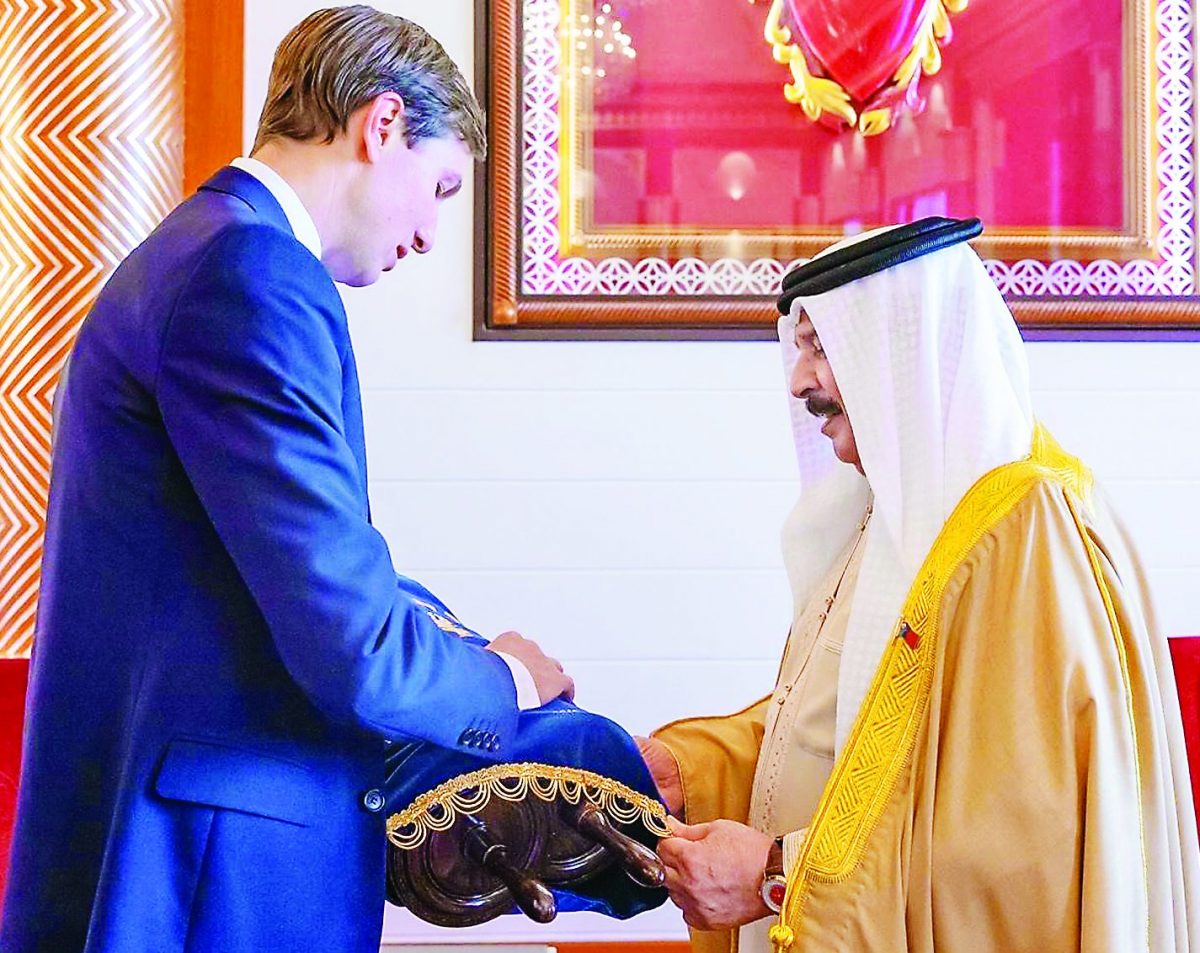
Featured Item

SA silent on historic Israel-Bahrain agreement
Published
4 years agoon
The Kingdom of Bahrain has joined the United Arab Emirates (UAE) in recognising the state of Israel, an agreement formalised with the historic signing of the Abraham Accords at the White House on Tuesday, 15 September.
As this small Arab country joined hands with the small Jewish state, South Africa’s department of international relations and cooperation (DIRCO) was silent on the matter – in stark contrast to its condemnation of the UAE-Israel agreement a month ago.
The SA Jewish Report repeatedly asked DIRCO for a statement on the Bahrain-Israel agreement, but none was forthcoming.
It seems that this silence on South Africa’s part could be because “South Africa was caught off guard on the UAE announcement, and I think the addition of Bahrain and other Arab countries to the accords could put South Africa in a very awkward spot, having to re-evaluate its somewhat myopic stance on Middle East relations,” says local political analyst Daniel Silke. “South Africa was diplomatically unprepared for this rapid turn of events, and is probably scrambling to form some kind of new strategy.”
Steven Gruzd, political analyst at the South African Institute of International Affairs, agrees that this is a “fairly unexpected development. Almost at the last minute, Bahrain also decided to normalise relations. However, it’s not as if South Africa hasn’t had time to respond, so it could be that it doesn’t want to give more attention to this. We know that South Africa is on the side of the Palestinians, who feel betrayed by these developments. South Africa has made its views clear. Maybe Bahrain wasn’t ‘important’ enough to comment further.”
Gruzd says the agreement is significant in that this is the fourth Arab state to recognise Israel – along with Egypt, Jordan, and now the UAE. “Israel has long strived for recognition and normalisation in the region. Bahrain is a small but wealthy country, and like Saudi Arabia and the UAE, is opposed to Iran. There are business and cultural opportunities. It is the ‘second domino’ to have fallen. At the signing ceremony, both United States President Donald Trump and Israeli Prime Minister Benjamin Netanyahu hinted that five or six Arab countries may follow, and Netanyahu spoke of the ‘circle of peace’ that he wants to expand.”
Furthermore, “While these are the first Arab nations to recognise Israel since Jordan and Egypt, those have generally been a ‘cold peace’ amongst elites and leaders. There hasn’t been much ‘people to people’ contact,” says Gruzd. “It seems like the Abraham Accords formalised what was already happening in the background. For a decade or more, there has been extensive Israeli investment in both the UAE and Bahrain, but it has been below the radar. This now brings it out into the open.”
He says the agreement benefits Netanyahu in distracting attention from his domestic problems back home like the corruption charges and his handling of the coronavirus crisis. For Trump, it may benefit his election campaign, but “seven weeks is a long time in politics, and foreign policy doesn’t always have a strong impact on voters. It’s definitely a big deal, and credit is due to both Trump and Netanyahu. However it isn’t as big as peace between Israel and the Palestinians, which is a long way off.”
In terms of the impact this will have on Israel and the Palestinians, Gruzd says the Palestinians have largely rejected these developments, which they see as a betrayal. However, if they see the “dominoes falling” and normalising, there will be pressure on them to come to the table and compromise.
“At the signing ceremony, both the UAE and Bahraini foreign ministers talked about their support for a two-state solution and the Palestinians. However the Palestinians have now withdrawn their ambassadors from both states in protest, and have warned they will do so in other Arab countries that recognise Israel,” says Gruzd.
He notes, “At the signing ceremony, the body language showed that this was genuine, and based on a confluence of interests. No one was dragged there kicking and screaming.”
Silke says the agreement with Bahrain is possibly a “supporting act for what will be the big prize: Saudi Arabia joining the accords”.
As David Ignatius writes in the Washington Post, “The significance of Bahrain’s action is partly that it wouldn’t have happened without the blessing of Saudi Arabia, which is joined by a causeway to the small Persian Gulf state. The Saudis have historically exercised what amounts to a veto over Bahraini policy. In this case, the Saudis silently endorsed their tiny neighbour’s decision, rather than vetoing it.”
Writing in the New York Times, David Kirkpatrick elaborates, “Bahrain’s announcement that it would become the fourth Arab state to normalise relations with Israel was arguably the most significant clue yet that Saudi Arabia – the heavyweight of Gulf politics – might be moving in the same direction, albeit on its own slower time scale.”
“It’s symbolic of growing reconfiguration in the Middle East,” says Silke. “If more Arab countries join the accords, it will put immense pressure on Iran to soften its stance. These accords have decoupled the broader Middle East from the Palestinian question, enabling the establishment of relations. In turn, the Palestinians may have to soften their hard-line attitude to negotiations.”
Bahraini King Hamad bin Salman al-Khalifa’s senior advisor stated that the normalisation deal sent “a positive and encouraging message to the people of Israel that a just and comprehensive peace with the Palestinian people is the best path and the true interest for its future and the future of the peoples of the region”.
Bahrain and Saudi Arabia said they would allow flights from and to Israel to fly through their airspace, and the agreement will allow for the establishment of flights between Tel Aviv and Bahrain’s capital, Manama.
The Palestinians recalled their ambassador from Manama and Abu Dhabi as a sign of protest. Closer to home, Africa4Palestine (formerly Boycott Divestment Sanctions South Africa) held a protest against the Abraham Accords outside the UAE embassy in Pretoria.
Meanwhile, Australia, Brazil, Canada, Costa Rica, Croatia, Cyprus, Czech Republic, Egypt, Estonia, the European Union, Germany, Greece, Kosovo, Latvia, Oman, Romania, the UAE, the United States, and the United Kingdom, have all expressed support for the agreement between Israel and Bahrain. The Palestinian leadership, Iran, Turkey, Yemen, the Palestinian Islamic Jihad, and Hezbollah condemned the move. It’s clear that South Africa must decide which side it’s on.
There is no South African representation in Bahrain, but the South African ambassador to Riyadh is accredited to Manama on a non-resident basis. Bahrain has no representation in South Africa.
Rowan Polovin, the national chairperson of the South African Zionist Federation, said, “The SAZF welcomes the announcement that the Kingdom of Bahrain will be normalising diplomatic relations with Israel. Such improved diplomatic, economic, and bilateral relations between Arab nations and Israel are of great importance and work to the benefit of Israel, the Arab states, and the region. Increased dialogue and engagement leads to a path of greater stability, prosperity, and peace in the Middle East, and between Israel and the Palestinians. We urge South Africa to react positively, and encourage these momentous developments and changes for good










